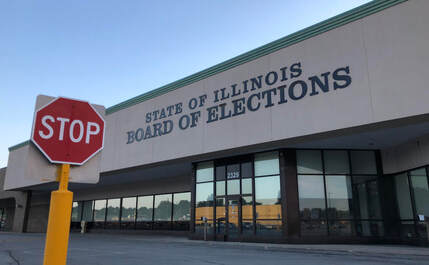Illinois Campaign Season Opens Tuesday
By BRIAN MACKEY • SEP 3, 2019
Tuesday marks the official beginning of campaign season in Illinois — the day potential candidates can start circulating petitions to get their names on the ballot.
In Illinois, people can’t really be political candidates until they collect enough signatures — anywhere from hundreds to thousands, depending on the office. State election law dictates when that process can begin; this year it’s Sept. 3.
Collecting signatures is high stakes — if a potential candidate fails to get enough legitimate registered voters to sign the petition, and a potential candidate will never make it onto the ballot.
Political parties have traditionally helped candidates with this and other technical tasks of campaigning. But in an effort to increase the diversity of people running for office, a number of groups are working alongside or outside the party system to educate neophyte politicians.
Among them is The Lincoln Series, which trains Republican women on petitions, fundraising, and the related nuts-and-bolts of running for office.
“We’ve had more than 200 women who have graduated,” The Lincoln Series’ Katie Justak said. “With the tools and the resources that they have garnered from the Lincoln Series program, (they've) gone on to serve in a plethora of positions.”
Justak acknowledged Democrats have had more success than Republicans in getting women to run for office, and hopes to reverse that trend.
Another group looking to increase the number of women in office is Illinois Democratic Women.
Co-president Jennifer Lee said when she's pitching potential candidates, “I kind of copy off of President Obama: If you see something you want to change, pick up a clipboard and put on your tennis shoes and start getting names — get your petitions — and get on the ballot.”
Lee said she expects a record number of Illinois Democratic women will be running in 2020.
Candidates have 90 days to collect signatures. Petitions are due to the State Board of Elections by Dec. 2.
In Illinois, people can’t really be political candidates until they collect enough signatures — anywhere from hundreds to thousands, depending on the office. State election law dictates when that process can begin; this year it’s Sept. 3.
Collecting signatures is high stakes — if a potential candidate fails to get enough legitimate registered voters to sign the petition, and a potential candidate will never make it onto the ballot.
Political parties have traditionally helped candidates with this and other technical tasks of campaigning. But in an effort to increase the diversity of people running for office, a number of groups are working alongside or outside the party system to educate neophyte politicians.
Among them is The Lincoln Series, which trains Republican women on petitions, fundraising, and the related nuts-and-bolts of running for office.
“We’ve had more than 200 women who have graduated,” The Lincoln Series’ Katie Justak said. “With the tools and the resources that they have garnered from the Lincoln Series program, (they've) gone on to serve in a plethora of positions.”
Justak acknowledged Democrats have had more success than Republicans in getting women to run for office, and hopes to reverse that trend.
Another group looking to increase the number of women in office is Illinois Democratic Women.
Co-president Jennifer Lee said when she's pitching potential candidates, “I kind of copy off of President Obama: If you see something you want to change, pick up a clipboard and put on your tennis shoes and start getting names — get your petitions — and get on the ballot.”
Lee said she expects a record number of Illinois Democratic women will be running in 2020.
Candidates have 90 days to collect signatures. Petitions are due to the State Board of Elections by Dec. 2.


